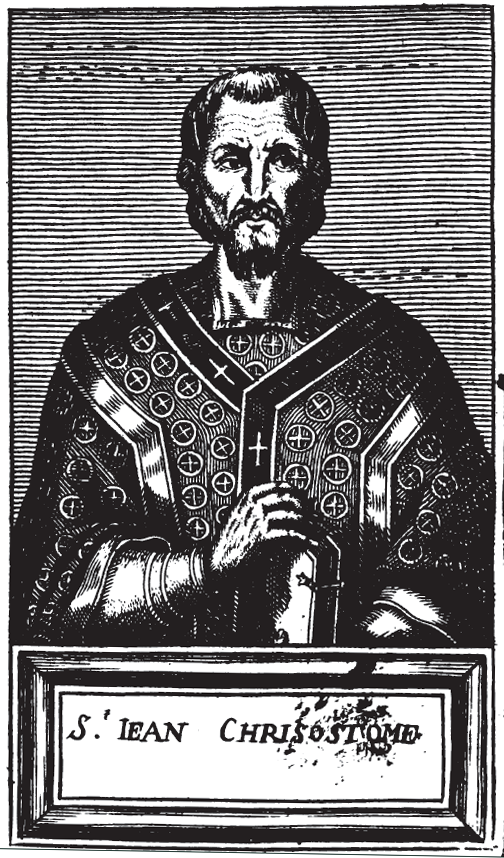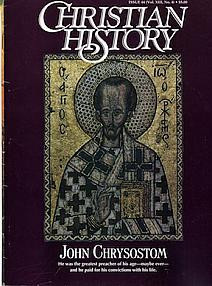JOHN’S GOLDEN MOUTH MADE HIM FAMOUS AND CAUSED HIS EXILE

[Above: John Chrysostom.—Andre Thevet. Histoire des plus ilustres et scavans hommes de leurs siecles, 1671. public domain]
JOHN WAS such a brilliant and forceful preacher that an admirer gave him a nickname that stuck: Chrysostom, “golden mouthed.” But the same attributes that raised him to fame brought about his exile and death.
Reared in Antioch, Syria, by his mother, a Christian widow, Chrysostom studied rhetoric under Libanius, a pagan master of the art. However, he found himself attracted to Christianity and switched his concentration to theology. Becoming a hermit, he ruined his health in ascetic practices. Returning to Antioch he reluctantly accepted a church position.
He rose to fame in 387 after rioters defaced imperial statues in Antioch. While old bishop Flavian hurried to Constantinople to plead for mercy, terrified townsfolk crowded to hear Chrysostom preach “the homilies on the statues.” Typical of his admonitions were his words, “[We have] a fear of death, which is a mask that might well be despised; but have no fear of sin, which is truly dreadful; and, even as fire, devours the conscience. . . . Sorrow not for the dying man; but sorrow for him who is living in sin!”
When the patriarch of Constantinople died, Theophilus, patriarch of Alexandria, wanted to place his own candidate in the vacant post. But Eutropius, the powerful court chamberlain, did not want Theophilus to have that much influence. He determined to obtain Chrysostom for the post because of his impressive rhetoric, and he threatened the despicable Theophilus with well-deserved criminal charges unless he supported Chrysostom. Theophilus caved.
Eutropius then persuaded Emperor Arcadius to agree to accept Chrysostom. With imperial backing, he quietly kidnapped the priest, whose people would not otherwise permit him to leave Antioch. Once Chrysostom realized what was happening, he protested, but to no avail. Off to Constantinople he must go. On this day, 26 February 398, Theophilus himself consecrated Chrysostom.
At first, both nobles and commoners were pleased with their new patriarch. Theophilus, however, retained intense hatred of him. And because Chrysostom preached with scathing satire against the sins of his age, he roused opposition. He especially angered those who lived in excessive luxury and who abused their wealth—sins of which Empress Eudoxia, most courtiers, and many churchmen were guilty. It did not help that slanderers accused him of comparing Eudoxia to Jezebel, the wicked queen of the Old Testament.
In 403, Theodosius and the empress colluded with Chrysostom’s ecclesiastical enemies to call a council to condemn him. The Bishop of neighboring Chalcedon readily hosted the council. The hostile prelates ordered Chrysostom to appear, but he refused, saying a council of his enemies was no proper venue to try him. Rather, a council of the whole church ought to determine his fate. The council said that his refusal to appear was sufficient cause for condemnation. Eudoxia prevailed on weak-willed Arcadius to immediately exile Chrysostom.
However, some event soon frightened her and in superstitious terror she demanded the archbishop’s recall. Mobs threatened Theophilus, who fled. After three days of pleas and promises, Chrysostom returned.
A few months later the city dedicated a silver statue of Eudoxia. The festivities included indecent and pagan entertainment. Chrysostom thundered against the depravity. In fury, Eudoxia called for his exile. Chrysostom compared her to Herodias, the wicked Bible queen, who had demanded the head of John the Baptist on a platter.
The breach was irrevocable. At Easter 404, soldiers drove catechumens from Chrysostom’s cathedral. When the people regrouped for baptism at the public baths, soldiers set upon them with swords. Chrysostom was a prisoner in his own home. Finally, shortly after Pentecost, the emperor forced him out of Constantinople. The Church of St. Sophia burned that night, each side accusing the other of setting the fire.
In exile, Chrysostom continued to correspond with faithful friends. To end even this influence, the emperor ordered him transferred to a distant post on the Black Sea. He appointed two guards known for ferocity to march the sick man without mercy until he dropped. They obeyed. Chrysostom died 14 September 407.
—Dan Graves
----- ----- -----
Christian History #44 is devoted to John Chrysostom






